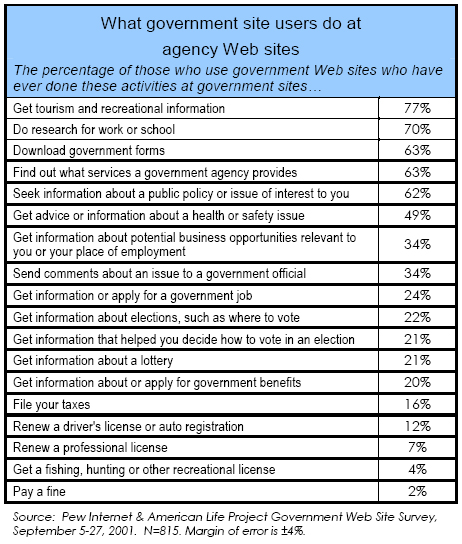The rise of the e-citizen
Web presence is not optional for governments in the United States. Citizens are online and learning to demand answers at Internet speed. Government budget-writers require that the cost-savings potential of the Internet be mastered. At the same time, laws and executive orders mandate the provision of at least some services online.
And Americans are stepping up to use them. Fully 68 million American adults have used government agency Web sites – a sharp increase from the 40 million who had used government sites in March 2000 when we first polled on the subject. They exploit their new access to government in wide-ranging ways, finding information to further their civic, professional, and personal lives. Some also use government Web sites to apply for benefits, engage public officials, and complete transactions such as filing taxes.
While many government site users focus on their personal needs in dealing with government agencies, there is abundant evidence that a new “e-citizenship” is taking hold:
-
42 million Americans have used government Web sites to research public policy issues.
-
23 million Americans have used the Internet to send comments to public officials about policy choices.
-
14 million have used government Web sites to gather information to help them decide how to cast their votes.
-
13 million have participated in online lobbying campaigns.
Other key findings:
- Satisfied searchers: Most government Web site visitors are happy with what they find on the sites; 80% of them say they find what they are seeking on the Web sites.
- Improved relations with government: Overall, 60% of government Web site users say such sites had improved their interactions with at least one level of government. Half of government Web site users (49%) say the Internet has improved the way they interact with the federal government; 44% say it has improved the way they interact with their state government; and 30% say the Internet has improved the way they interact with local government.
- Federal and state sites get better grades than local sites: Federal and state Web sites are more popular than local Web sites: 80% of government Web site users have visited federal sites, 76% have visited state sites, and 41% have visited local government Web sites. Generally, seekers find the information they want more easily on federal (68%) and state (69%) Web sites than they do on local government sites (46%). Federal and state sites get higher evaluations from these Internet users.

- Filing taxes online and saving time: As of last autumn, 16% of those who use government Web sites had filed taxes online. Some 70% of those who filed their taxes online say they have saved time doing this online and about half of them say they saved more than an hour. About 12% of government Web sites users have renewed an automobile registration online.
- Tell us about our Social Security accounts. The most frequently cited service that government users would like to have is to be able to access their Social Security account information. Currently, the Social Security Administration allows individuals to request copies of their statements via the Internet, but the information is then sent to them through the mail rather than to their desktops. Experiments with providing the statements online ended in April 1997 amid concerns about ensuring the confidentiality of the data.
- Many still learning all they can do at government Web sites. Asked about their most recent visit to a government site, 38% of these Internet users said they were performing a new activity; 60% were doing something they did before at a government site.
- Use of government sites since September 11: Many government agencies became more anxious to convey key information through their Web sites since the September 11 terror attacks and the early October anthrax scares. For a relatively small number of Internet users, this was an important way for them to get information about government policies and recommendations. About 7% of those who access government sites have turned to them in response to major news events and about three-quarters of that small subgroup got information related to the September 11 attacks and the aftermath. And half of that 7% have used the Internet to email an elected official in response to the attacks. This is roughly the same as the number of people who wrote to or telephoned their officials. Similarly, about half have used the Internet to get information about how to get involved politically.
About the surveys: The findings in this report come from several surveys by the Pew Internet & American Life Project. The figures about the overall group of Internet users who go to government Web sites come from a phone poll of 2,391 people taken in January 2002. The more in-depth assessment of hhow people use government Web sites comes from a survey of 815 people who had told us in previous surveys that they used government Web sites. This separate survey was conducted between September 5 and 27, 2001 (we made no calls on September 11). Finally, the material about how people used government Web sites after September 11 comes from the ongoing polling we did between September 12 and November 18 about Internet use related to the attacks, the anthrax scares, and the U.S. military campaign against the Taliban in Afghanistan.




